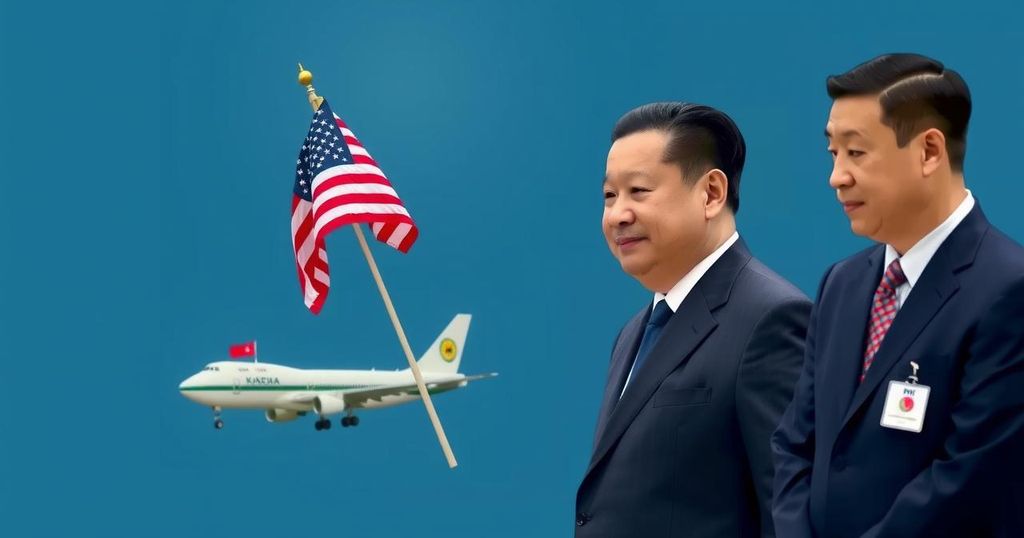Indonesia’s President Prabowo Subianto to Embark on His First International Tour to China and the United States
President Prabowo Subianto of Indonesia plans his first foreign trip next month to China and the United States, aiming to raise Jakarta’s international profile. He will meet with key leaders including Chinese President Xi Jinping and U.S. President Joe Biden, among others, during his travels to various countries including Peru, Brazil, and Great Britain, focusing on international cooperation and welfare improvement.
Indonesia’s President Prabowo Subianto is scheduled to embark on his inaugural foreign tour next month, visiting China and the United States, as reported by local media on Tuesday. The 73-year-old former general, sworn into office on October 20, has emphasized his intention to adhere to Indonesia’s longstanding non-aligned foreign policy, while simultaneously enhancing the nation’s global presence. During this first series of international engagements, he is expected to travel to China, the United States, Peru, Brazil, and the United Kingdom, as per information from the newspaper Kompas, citing sources within the presidential palace. Prabowo is set to commence his journey with a state visit to Beijing on November 8, where he aims to meet with Chinese President Xi Jinping and Prime Minister Li Qiang. Thereafter, he will proceed to Washington for discussions with U.S. President Joe Biden. The precise timing of his visit to the United States has not yet been disclosed, but it coincides closely with the U.S. election occurring on November 5, shortly before Prabowo’s departure from Indonesia. Previously, Prabowo faced obstacles in engaging with the United States due to his human rights record, which led to a U.S. visa ban during the regime of former President Suharto; however, this ban was lifted under the Trump administration. Following Washington, Prabowo will continue to Peru for a meeting with President Dina Boluarte and to participate in the Asia-Pacific Economic Cooperation (APEC) Summit in Lima. His travels will also take him to the G20 summit in Brazil, culminating in a visit to the United Kingdom to engage with King Charles III and Prime Minister Keir Starmer. While details are still being finalized, Hasan Nasbi, spokesperson for the presidential palace, has declined to confirm the specifics of the visits. The Indonesian foreign ministry did not immediately respond to requests for comments from the media. According to Kompas, the central theme of the discussions during these visits will focus on enhancing cooperation and improving the welfare of participating nations. Since his election victory in February, Prabowo has utilized an eight-month transition period to travel to over a dozen countries, illustrating a proactive approach to foreign policy that contrasts with his predecessor, Joko Widodo, who placed greater emphasis on domestic issues.
The visit of President Prabowo Subianto marks a significant shift in Indonesian foreign policy. Prabowo’s commitment to enhance Indonesia’s global engagement reflects a broader strategy to elevate the country’s international stature, particularly as the fourth most populous nation in the world. His choice of initial destinations—China and the United States—highlights the importance of these nations in global geopolitics, especially in light of Indonesia’s role in regional stability and economic growth. Furthermore, Prabowo’s past controversies surrounding human rights add a layer of complexity to his international relations, which he aims to navigate as he embarks on this diplomatic journey.
In summary, President Prabowo Subianto’s upcoming foreign tour represents a pivotal moment for Indonesia’s international relations. By visiting major powers such as China and the United States, he aims to assert Indonesia’s role on the global stage and to foster cooperative efforts focused on mutual welfare. This journey not only signifies his administration’s commitment to foreign engagement but also reflects a strategic shift away from stricter domestic focus, enhancing Indonesia’s diplomatic presence and influence.
Original Source: www.barrons.com




Post Comment